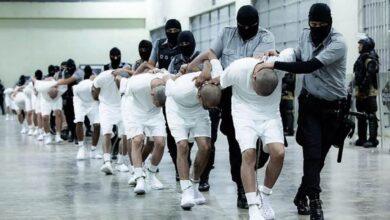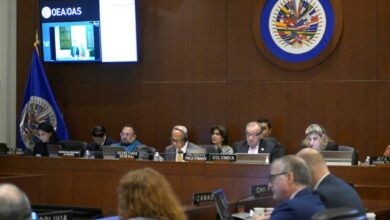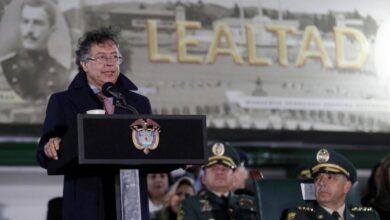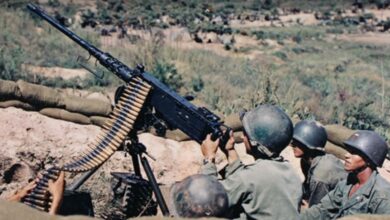Ukraine: The Negotiation for Peace Is Not Seen as a Priority In the Government
The Ukrainian president, Volodimir Zelenski, does not consider it appropriate, for now, to resume peace talks with the Russian government because several coups have been carried out in combat that could lead the Ukrainian militias to a social and territorial victory .

Photo: TW-ZelenskyyUa
LatinAmerican Post | David García Pedraza
Escucha este artículo
Leer en español: Ucrania: La negociación por la paz no es vista como una prioridad en el gobierno
The Ukrainian offensive against the Russian army is gradually giving the Kiev government a gradual gain in terms of territorial recovery. The tactical movements of the Ukrainian Military Forces have made the Russian strongholds distance themselves to the point of considering the comeback that Moscow has been given victorious.
With these results for Ukraine, President Zelensky is at a diplomatic crossroads: continue to seek peace with his Russian neighbor or continue the conflict given the triumphs of his nation's military arm. However, despite the peace slogans from the West, Zelenski would be leaning towards the second option: the continuation of the war.
A Change of Position: a Formula to Mislead
A week ago, during the G20 summit in Bali, Indonesia, Ukrainian President Volodymyr Zelensky addressed the community of the 20 most economically influential countries in the world. He explained his peace proposal to Russia, which consists of 10 points, with the priority being the release of prisoners, nuclear security and the withdrawal of Russian troops.
The proposal in its entirety caused so much anger in the Kremlin that its response was a bombing of Ukrainian territory by Moscow. However, Zelenski, foreseeing this, remains firm in the offensive that is being carried out against the Russian troops in Ukrainian sovereignty.
Seeing the progress that the Ukrainian army and its volunteers have had since September, Zelenski would be betting on the end of the conflict by force, but not through negotiations with the Russian delegation. An example of this is the aid that it continues to receive from the United States, where the North American country continues to send weapons to Kiev.
The Ukrainian population seems to agree with this new course that the government would take. According to Gallup, 70% of respondents support the war towards victory, while 26% are more aligned with aiming for peace negotiations.
Finally, an act of "lowering one's guard" would be responsible for Zelenski not considering entering into dialogue with his Russian counterpart because it is possible to infer that he considers that by sitting down at the table, Moscow would take advantage of this maneuver to build a better attack tactic that allows them to advance and conquer Ukrainian territory while diplomats try to defuse the conflict.
Similarly, Ukraine may view a negotiated solution with little optimism. This is because since 2014, after the annexation of Crimea and the war against pro-Russian militias in Donbass, the negotiated exit with Moscow has been inefficient. Zelenski understands that Russia is a difficult negotiator and will not easily give in to a deal that looks like defeat.
Dialogue this Time Is Not an Option for Ukraine
The constant withdrawals of Russia, such as a clear defeat of the early conquest of Ukrainian territory, has raised the possibility that kyiv could preserve its sovereignty and recover the one it possessed in 2014, when Russia annexed Crimea. The foregoing, based on a referendum where the option "to belong to Russia" was victorious with more than 95% of the votes, with more than 57% of the eligible population participating.
The idea of recovering the borders that both nations had before 2014 is a very utopian idea on the part of Kiev, to which Moscow is looking carefully because there are few, but possible scenarios, where Crimea could once again be part of the Ukrainian sovereignty.
With Zelenski's urgency for Ukraine to be accepted into NATO and the European Union, this first continental alliance, a request for quick access was sent at the end of September. However, this was denied because the 30 members must approve it unanimously. In the case of the European Union, the situation is in a constant 'we will see'.
Russia also tries to repel the advance that Ukraine has had in recent battles because if Ukraine finally manages to enter NATO, Kiev would have the backing of 30 nations to defend the territory conquered by Moscow and try to recover the 2014 borders, thus the biggest victory for Kiev and the worst defeat for Putin. However, this could escalate the conflict to a possible nuclear war, something that both parties try to avoid.
Elections Defined by Results on the Battlefield
Both Russia and Ukraine will have 2024 presidential elections. The results of the war between the two nations, and the situation that has been experienced since February 2022, will be crucial to, on the one hand, define a possible re-election of Putin for the period 2024-2030 and, in the case of Zelenski, also apply to be re-elected for the term 2024-2029.
Three scenarios could be presented depending on how the war develops until 2024, in case it extends during the next two years. The first is that Putin and Zelenski are re-elected, thanks to their ability to deal with the conflict and create a 'status quo' of the situation. The second is that only one of the two is re-elected and in that case there could be the possibility of de-escalation of the war or the opposite effect, (it would be necessary to see which political current prevails in each country, where, surely, they will take the solution to war as a baton to win the elections). The third, where neither of them is re-elected, and two new leaders take the bastion of their military forces.
For each of these scenarios, what happens in the war will be vital. Apparently, an active conflict would favor both leaders, since in times of war, the leaders are usually watched closely, especially when they are winning. But also, faced with an eventual diplomatic solution, both Putin and Zelenski would have to give in. The problem is knowing to what extent.
If Ukraine cedes sovereignty in Crimea or the recently annexed territories, Zenelnsky will go down in history as the president who handed over half the territory. For his part, after escalating the conflict and the human lives lost, if Putin does not come out with at least Crimea and a promise of Ukraine's non-adherence to NATO, he will remain as the president who wasted resources and human lives to change of nothing.
For now, Zelenski and Putin are trying to hoard victories, spare losses and wait for the decision of NATO, a key organization that will open a new chapter in this conflict that has afflicted Eastern Europe, its surroundings and the entire world for the past nine months.





